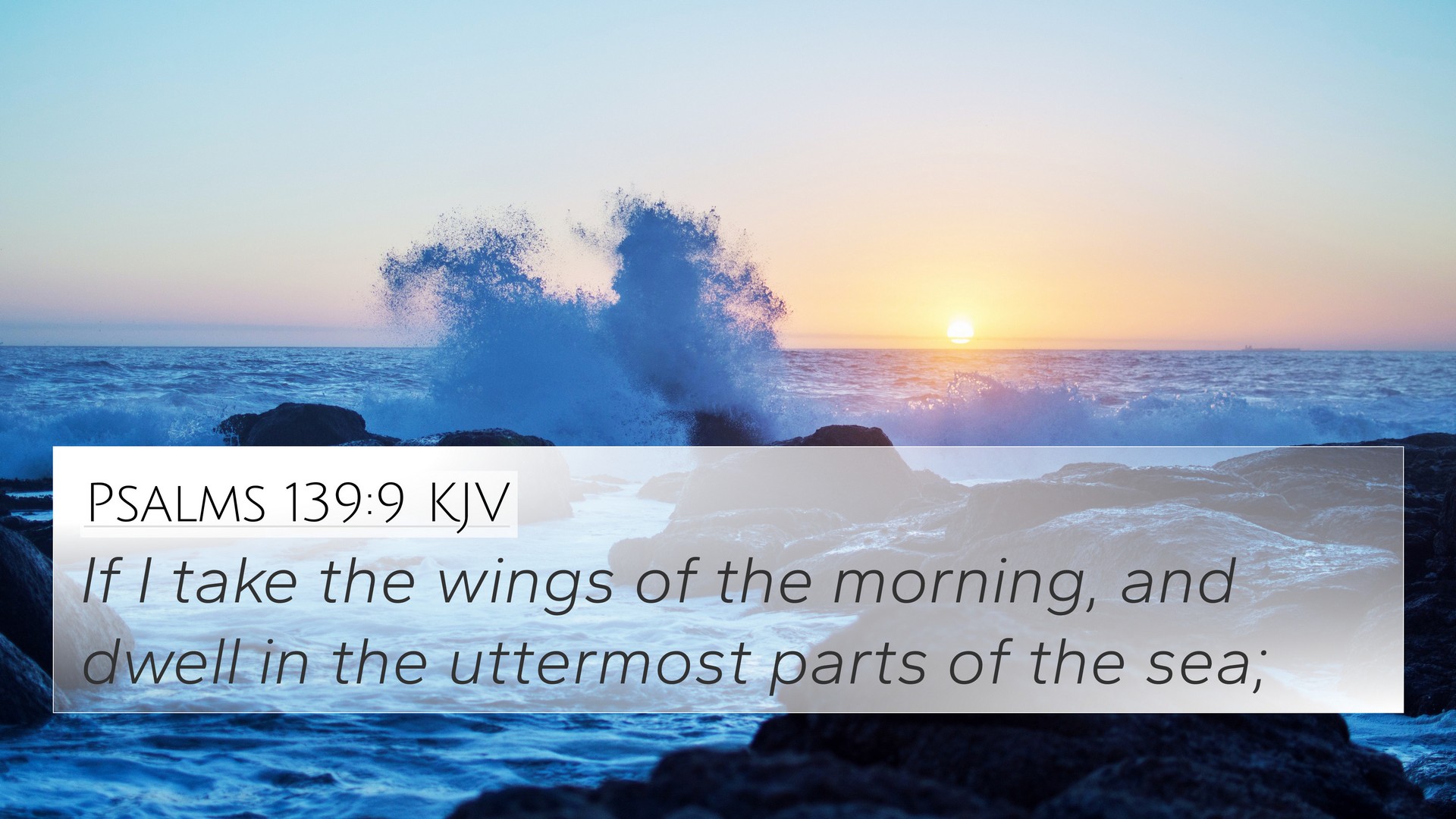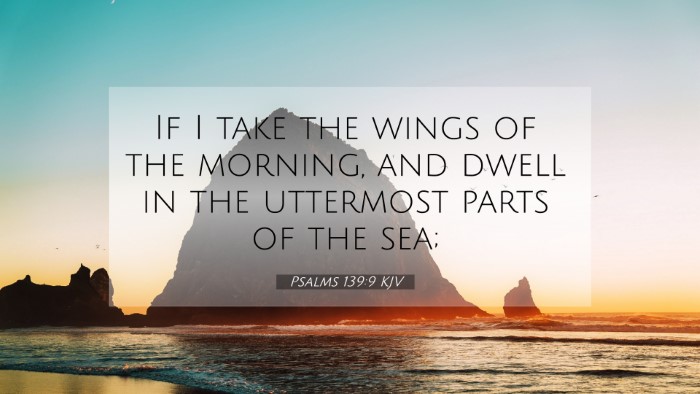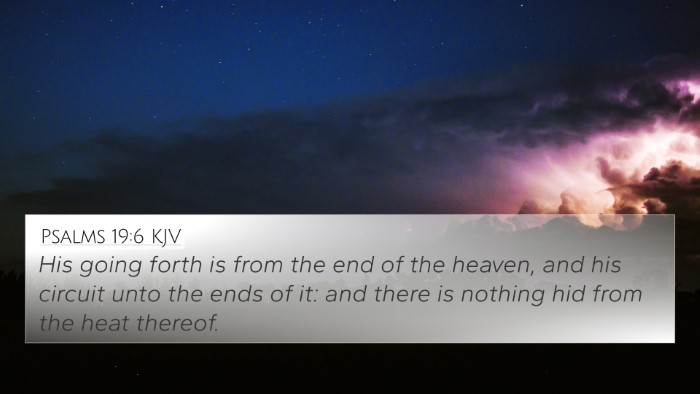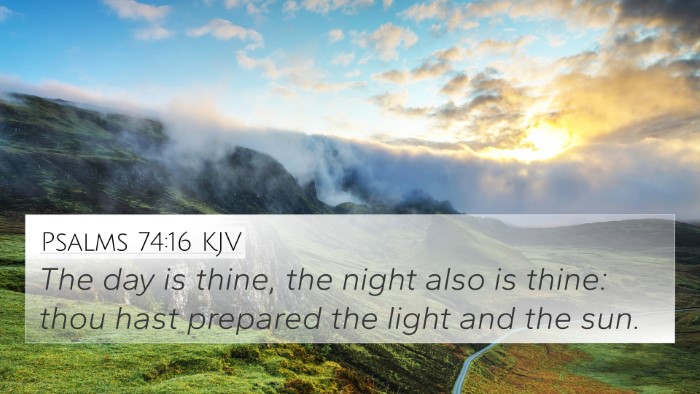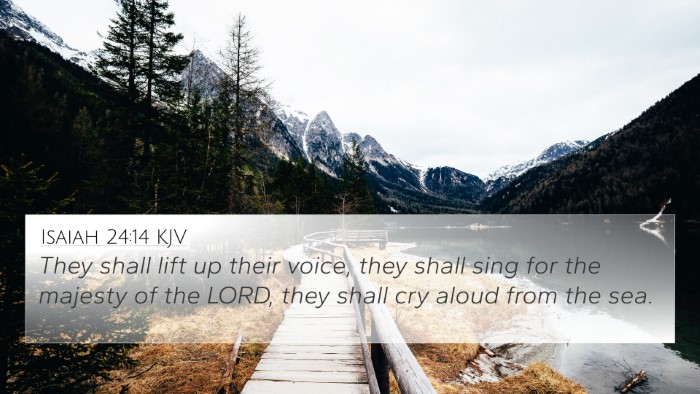Psalms 139:9 - Understanding and Interpretation
Psalms 139:9 states, "If I take the wings of the morning, and dwell in the uttermost parts of the sea." This verse speaks profoundly about the omnipresence of God and humanity's yearning for divine connection, regardless of distance.
Summary of Insights
Several public domain commentaries provide rich insights into this verse, allowing us to gain a deeper understanding:
Matthew Henry's Commentary
Matthew Henry emphasizes the vastness and boundless nature of God's presence. In this verse, the "wings of the morning" symbolize speed and the impossibility of escaping God's watchful eye. He notes that even in the most distant place one could imagine, God is still present. This idea reinforces the believer's assurance that they are never far from divine oversight and care.
Albert Barnes' Notes
Albert Barnes elaborates on the imagery presented in Psalms 139:9. He highlights that the "uttermost parts of the sea" suggests extreme isolation, yet even there, the psalmist acknowledges God's presence. Barnes points out that this verse combines a yearning for freedom with the acknowledgment that one cannot truly flee from God. It reflects a universal truth about God's omniscience and omnipresence.
Adam Clarke's Commentary
Adam Clarke interprets this verse in the context of a quest for finding solace or respite away from troubles. He comments on how the "wings of the morning" imply a swift escape from difficulties, yet the psalmist recognizes that distance does not equate to separation from God. Clarke’s perspective adds a personal dimension, emphasizing that God is a constant source of help no matter how far one feels from their troubles.
Bible Verse Cross-References
To further enrich the understanding of Psalms 139:9, we can examine related scriptures that echo its themes of divine presence and protection:
- Psalms 139:7: “Where shall I go from your Spirit? Or where shall I flee from your presence?” - This verse poses questions which directly resonate with the sentiment in Psalms 139:9.
- Jonah 1:3: “But Jonah rose to flee to Tarshish from the presence of the Lord.” - This illustrates an attempt to escape God’s presence, mirrored in the themes of distance in Psalms 139:9.
- Matthew 28:20: “And behold, I am with you always, to the end of the age.” - Jesus reassures His followers of His constant presence, paralleling the affirmation in Psalms 139:9.
- Acts 17:27: “That they should seek God, and perhaps feel their way toward him and find him. Yet he is actually not far from each one of us.” - This highlights God’s proximity and accessibility.
- Hebrews 4:13: “And no creature is hidden from his sight, but all are naked and exposed to the eyes of him to whom we must give account.” - A reminder that God sees all, integrating with the themes of Psalms 139.
- Psalms 46:1: “God is our refuge and strength, a very present help in trouble.” - This provides the comforting assurance of God’s enduring presence during trials.
- Jeremiah 23:24: “Can a man hide himself in secret places so that I cannot see him? declares the Lord. Do I not fill heaven and earth? declares the Lord.” - Reinforces the idea of God’s omnipresence.
Thematic Connections
Psalms 139:9 also interlinks with other thematic elements found throughout the Bible, including:
- Omnipresence of God: The idea that God is everywhere and watching over His creation.
- God as a refuge: The Biblical theme that no matter where we go, we can find solace in God.
- Search for God: Many verses emphasize the quest for divine connection, paralleling the search depicted in Psalms 139:9.
- Divine knowledge and assurance: The psalmist’s realization that God knows our thoughts and whereabouts, providing comfort.
Using Cross-References for Deeper Study
Understanding such verses becomes particularly fruitful when employing various tools for Bible cross-referencing.
- Using a Bible concordance can help locate themes and similar verses quickly.
- The Bible cross-reference guide allows for comparative analysis across scripture.
- Cross-reference study can enhance sermons or personal study by highlighting connections between texts.
- Utilizing a Bible reference resource can yield discoveries in related verses that enrich understanding.
In conclusion, Psalms 139:9 encapsulates a profound theological and spiritual message about God’s omnipresence. By linking this verse with related biblical texts and themes, we gain a deeper appreciation of its implications for believers seeking comfort in God's constant presence.
